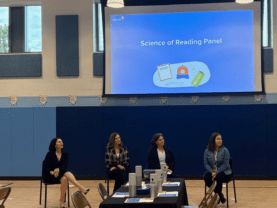Michigan’s renewed literacy mission
With the passage of Public Acts 146 and 147 of 2024, Michigan reaffirmed its commitment to ensuring every student reads proficiently by the end of third grade. These updates to the state’s original Read by Grade Three law strengthen early identification for reading difficulties, expand expectations for structured literacy, and continue the requirement for Individual Reading Improvement Plans (IRIPs) for K–3 students who need additional support.
For Michigan educators, IRIPs are a vital part of how they support early readers. But turning those plans into consistent, personalized instruction across every classroom isn’t easy.That’s why many districts are turning to eSpark as an essential partner in Michigan IRIP support, combining evidence-based instruction, adaptive technology, and actionable progress data in one cohesive system.
The evolving landscape of Michigan IRIPs
Michigan’s IRIP requirements are grounded in clear intent:
- Screen early and often. Districts must administer their selected screening assessment for grades 1-3 within the first 30 school days of the year (and for kindergarten within 90 days), selecting from assessments approved or validated by MDE.
- Provide targeted interventions. Each student’s IRIP must outline explicit, evidence-based supports aligned to the Essential Instructional Practices in Early Literacy.
- Monitor and adjust. Educators must track progress multiple times per year and refine instruction as students advance.
- Engage families. Every IRIP must include a “read-at-home” plan to reinforce learning beyond the classroom.
These expectations are rooted in Michigan’s Read by Grade Three Guidance and reflect a growing state-wide shift toward structured literacy – explicit, systematic, and cumulative instruction informed by the science of reading.
Research from Michigan’s EPIC Policy Center highlighted early implementation challenges with the Read by Grade Three law – including wide variation in IRIP quality, documentation practices, and teachers’ ability to connect assessment data to instruction.
While those findings stem from the state’s initial rollout, many districts continue to face similar hurdles as Michigan expands its focus on structured literacy and dyslexia screening under Public Acts 146 and 147 of 2024.
Bridging policy and practice with eSpark
The heart of successful IRIP implementation isn’t paperwork – it’s consistency, engagement, and instructional precision. eSpark helps Michigan schools operationalize all three.
1. Linking assessment data to daily instruction
eSpark integrates with Michigan’s most commonly used diagnostics – including NWEA MAP and Renaissance Star – turning student results into personalized learning pathways. Teachers can immediately see where each child stands and how progress aligns with IRIP goals – eliminating guesswork between assessment and instruction.
2. Building structured literacy practice into everyday learning
Every eSpark reading Quest reinforces the key domains emphasized in the Essential Instructional Practices: phonemic awareness, phonics, fluency, vocabulary, and comprehension. Students move through adaptive lessons and teacher-assigned mini-skills that strengthen foundational skills with explicit, systematic guidance.
3. Engaging learners who need extra support
Students with IRIPs often need more than repetition – they need encouragement. eSpark’s game-based environment, authentic choice, and interactive elements motivate students to keep practicing skills that otherwise feel difficult. Teachers frequently report that students “look forward” to eSpark time – a critical factor in maintaining progress.
4. Simplifying progress monitoring and communication
Rather than juggling spreadsheets, teachers can view growth by domain directly in eSpark’s dashboard. These insights help educators document progress and refine IRIPs more efficiently while supporting data-driven conversations with families.
“Meeting every student’s needs can be overwhelming. eSpark makes differentiated planning easy, and it’s fun for the students. They’re engaged, they’re excited.”
— Elementary Teacher, Utica Community Schools
Michigan districts leading the way
Districts like Utica Community Schools have long recognized that the strength of an IRIP lies in what happens between reviews – not just during them. Using eSpark as part of their structured literacy framework, Utica’s students have outpaced expected NWEA reading growth by more than 10 points, validating the power of consistent, adaptive support.For administrators and literacy leaders, this data reinforces an emerging truth across Michigan: tools that bridge diagnostic precision and daily engagement can turn IRIPs from compliance tasks into engines of real improvement.
Aligning with Michigan’s literacy funding priorities
Because eSpark directly supports the instructional and monitoring components required in IRIPs, districts can leverage common Michigan funding streams – such as Section 31a At-Risk, Title I, or Early Literacy Grants – to support implementation.
As new dyslexia screening and structured literacy provisions take effect, districts investing in integrated solutions now will be best positioned for sustainability and compliance in the years ahead.
The future of IRIPs: continuous, data-driven literacy improvement
Michigan’s legislative updates have set a clear expectation: early literacy must be systematic, equitable, and measurable. But achieving that vision requires connecting every layer – assessment, instruction, intervention, and family engagement – into one continuous loop.
That’s the role eSpark plays for Michigan districts: making it possible to personalize reading instruction, track growth automatically, and sustain student motivation, all within a structured literacy framework.
Next steps for Michigan educators
If your district is looking to refine its IRIP implementation or strengthen its structured literacy strategy, explore eSpark’s dedicated Michigan IRIP hub for practical guidance:
👉 Visit eSpark’s Michigan IRIP Support Hub
Here you’ll find recommended IRIP language, usage guidance, and resources aligned with the “Read by Grade Three” law.To discuss your district’s literacy goals or funding options, connect directly with our team to explore how eSpark can support your teachers and students statewide.



